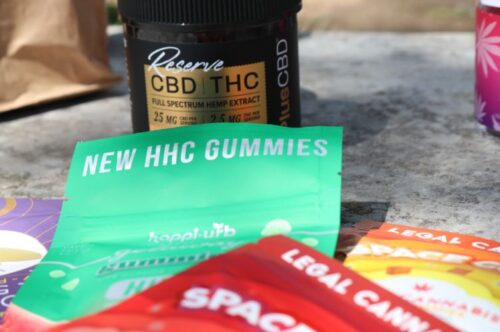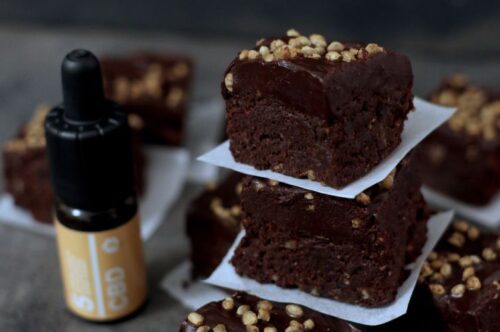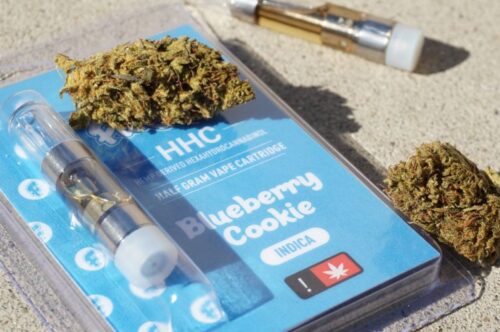CBD and HHC are the trendy new kids on the block in the health and natural medicine scene. These abbreviations have probably been thrown about way too much, especially CBD, but what do they actually stand for? In what ways do they vary? And how much do you need to know before delving into the fascinating world of these compounds? Hold on tight as we explore CBD and HHC and see what makes them so different from one another.

The Lowdown on CBD
Cannabidiol, or CBD for short, has emerged as one of the two most sought-after components in cannabis. But don’t worry; unlike its more well-known relative, THC, this won’t screw with your head.
In fact, CBD is the model student in this group because it does not produce the “high” typically associated with THC. You’ll achieve the peace and quiet you’ve been seeking with the help of this compound.
CBD, which is extracted from the versatile Cannabis sativa plant, has received a lot of interest for the potential health benefits it may provide. The compound can be found in many different forms, from oils and tinctures to brownies and lotions. However, hang on; before you go clicking “add to cart,” let’s get the facts straight first.

The legal status of CBD is less straightforward than we would like it to be. CBD derived from hemp with fewer than 0.3% THC content is legal in many parts of the world. However, the legality becomes murkier if it is derived from marijuana due to the plant’s increased THC level. Before deciding to make CBD a regular part of your routine, it’s a good idea to familiarize yourself with the legislation in your area.
Now comes the fun part—what exactly can CBD do for you?
The potential benefits of this cannabinoid are numerous. It serves as your personal medicine cabinet.
Many people attest to its efficacy as a painkiller, while others praise its soothing properties. There’s even a hint that it might help with seizures and sleep problems. CBD seems to have a knack for interacting with our body’s endocannabinoid system, a fancy network that regulates all sorts of important functions.
But, of course, there’s no rainbow without a little rain. CBD can come with side effects, like dry mouth, diarrhea (not the best party trick), changes in appetite, and fatigue. If you’re taking other medications, be a detective and check for potential interactions – CBD can be a bit of a social butterfly in your bloodstream, interacting with various enzymes.
And here’s the kicker: not all CBD products are created equal. With the CBD market exploding like a confetti cannon, there’s a concern about mislabeled products and shady characters trying to cash in quickly. Stick with trusted sources and brands, like Dutch Natural Healing for the best CBD oils and extracts, that are transparent about their testing practices. Safety first, always!
Enter HHC

Now, let’s talk about the newcomer – HHC, or hexahydrocannabinol. It’s like CBD’s enigmatic cousin who just rolled into town. You might not have heard much about HHC, and that’s because it’s the new kid in the class, quietly sitting in the back row.
HHC is not naturally occurring in cannabis plants but rather is produced in a lab through the conversion of other cannabinoids. Here’s another twist: research on HHC is as scarce as a unicorn in the wild. We don’t know much about its effects, uses, or even potential risks. It’s like a mystery waiting to be unraveled.
Legalities around HHC are about as clear as mud. Its relation to Delta-8 THC adds a layer of complexity. Regulations are still finding their footing in the ever-shifting landscape of cannabinoids. So, if HHC catches your interest, make sure you’ve got the legal green light in your area first.
As for its effects, HHC seems to have a bit of a reputation for psychoactivity – it might give you a little head trip. But before you dive in, know that research is scant, and its true potential is still veiled in uncertainty. Some say it could help with pain and nausea, and even give your appetite a friendly nudge. But, remember, these claims are like whispers in a crowded room – intriguing but not entirely reliable.
Safety is the name of the game, especially with a mystery cannabinoid like HHC. With limited research, it’s like stepping into uncharted territory. Proceed with caution and consider holding off until more substantial studies emerge.
CBD and HHC: Spotting the Differences
Alright, let’s do a little side-by-side comparison, shall we? Think of CBD as the laid-back buddy who’s always there to lend a helping hand. It doesn’t mess with your head, it’s been around the block (legally speaking), and its potential benefits are becoming clearer by the day.
HHC, on the other hand, is like the intriguing stranger who just moved into the neighborhood. It’s got a bit of a reputation for making heads turn, but it’s still a mystery that we’re trying to unravel. Legalities are hazy, effects are uncertain, and there’s a lot we don’t know.
What Happens When CBD and HHC Team Up?
You might have heard rumors about the “entourage effect.” No, it’s not a VIP party – it’s the idea that different cannabinoids (and terpenes) work better together, like a superhero team-up. But, before you start mixing and matching CBD and HHC, hold up.
Combining cannabinoids can be a bit like a chemistry experiment – unpredictable and potentially explosive. We’re still figuring out the interactions between these compounds. Your best bet? Talk to a medical professional before you play mad scientist with your wellness routine.
Sorting Out the Myths and Staying Safe
The CBD and HHC market isn’t all sunshine and rainbows. With great demand comes great responsibility – and, unfortunately, a fair share of shady operators. Some products might not deliver what they promise, and that’s a buzzkill. Stick with reputable brands and vendors who are upfront about their testing and sourcing.
And hey, special shoutout to the folks who need a little extra caution: if you’re a minor, expecting a bundle of joy, or planning a driving marathon, it’s a good idea to hit the brakes on CBD and HHC until we know more.
Looking Ahead: What’s on the Horizon
The future of CBD and HHC is like a treasure map waiting to be explored. As research dives deeper, we’ll unlock the secrets of these compounds and their potential. Legal landscapes might shift, regulations could change, and new discoveries could rewrite the rulebook.
But until then, tread carefully. Keep an eye on the research, stay informed about the laws in your neck of the woods, and remember – your wellness journey is a marathon, not a sprint. So, whether you’re team CBD, team HHC, or just a curious observer, here’s to making informed choices and riding the cannabinoid wave into a brighter, healthier future.





